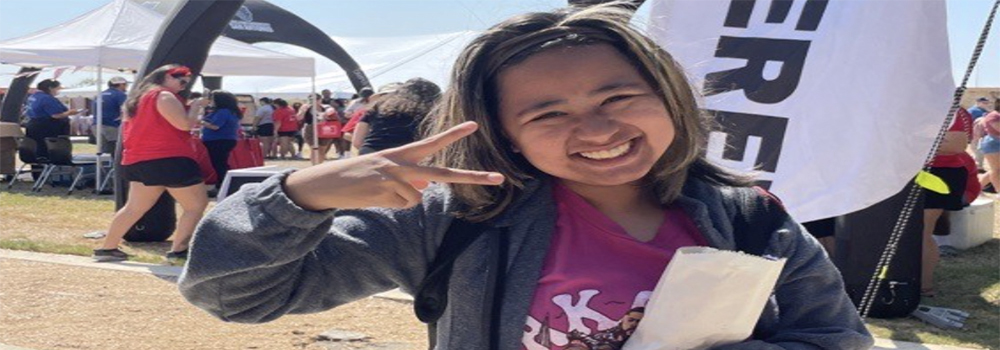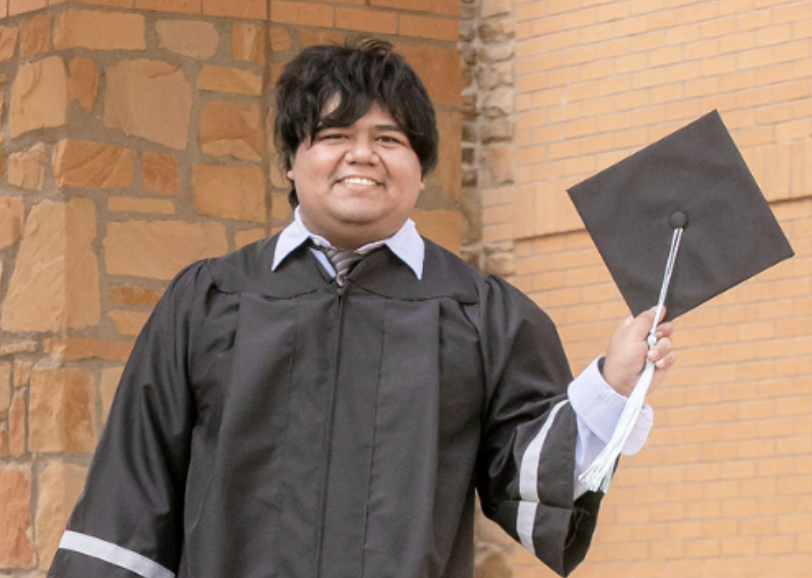Meera Phillips could have easily ended up another unfortunate statistic. She was born in India with intellectual disabilities and a severe speech impediment. Phillips never knew her birth parents and was facing an uncertain future when a family in Atlanta, Georgia, adopted her.
Growing up with a cognitive impairment, Phillips faced plenty of challenges, but she was determined not to let that hold her back from chasing her dreams. With the help of her family, she applied for and was accepted into A&M-San Antonio’s Transition University for Career Advancement and Successful Adulthood (TU CASA) program this spring. Now, she’s living independently, working at the University’s IT Department, participating in on-campus clubs and planning the next chapter of her life. Watch Phillips heart warming acceptance video.
“The work of TU CASA is a beautiful example of us fulfilling our mission. Our TU CASA family is uplifting the spirit of inclusivity at A&M-San Antonio and living it daily,” said Dr. Mariya T. Davis, an associate professor of special education and the principal investigator with the TU CASA program.
Davis works with Veronica Kallead, the TU CASA project director. Along with Dr. Eric Lopez and Dr. Gavin Watts (TU CASA Co-PIs), they lead a unique program that allows students with intellectual disabilities to receive a university experience while gaining the skills and knowledge needed to transition to independent adult lives.
TU CASA was funded by a $2.1 million grant from the US Department of Education – the first and the biggest federal grant received by the University at that time. The TU CASA program started in the spring of 2021 with the first cohort of five students. Each cohort goes through an 18-month program, during which they have access to all university services and support. While not required, the program encourages students to live on campus with other Jaguars.
TU CASA is a person-centered program that is customized for individual interests and goals. Upon completion, participants receive a University and Career Experience Certificate that’s geared towards specific career pathways and the development of independent living skills. This semester students also started working on nationally recognized employability credentials, which focus on job preparation and life skills.
Phillips, who communicates via a special speaking device, said that through the TU CASA program, she’s worked with success coaches and attended special classes and workshops. She recently started a new Pre-Employment Transition Services course on general office assisting.
“I am really happy about it because I know it is going to help me in all of my future jobs,” she said.
In addition, Phillips is an active member of the University’s Amigxs organization, a student-run group that focuses on social inclusion through various events and activities, like game night, movies and lunch outings. TU CASA students also exercise their leadership and self-advocacy skills as officers for the Amigxs organization. Phillips also works part-time in the IT department, where she’s sharpening her career skills. Moreover, Phillips lives on campus at Esperanza Hall and has learned to take public transportation.

“This is the first time that I have ever lived away from my family,” she said. “I am enjoying the experience, and it’s definitely going to help me in the future with my independence when I get my own place. When I graduate from TU CASA, I would like to save up and move into my own apartment.”
Kallead explains that not every student who applies is accepted into Tu CASA. The main requirement is a documented intellectual disability as the grant was awarded to support this particular population. Applicants must also be between 18 and 26 years old, have some experience in post-school, and be able to read at a sixth-grade level. Applicants must also hold their own guardianship.
“The main outcomes for our students are independence and employability skills,” said Kallead. “We want students to lead their educational endeavors and make decisions for themselves. We want them to gain autonomy and self-advocacy.”
“We work closely with families and help them to understand that it is time to ‘pass the torch,’” Davis added. “Students have the right to be actively involved and act as empowered leaders, not spectators, because active student participation is critical in an effective transition to independent adult life.”
Each cohort starts during the spring semester, followed by a week-long summer boot camp, during which students live on campus. “They learn about independent living skills, like cooking, money management, and community navigation,” said Kallead. “It’s really cool to see them grow, get out of their comfort zone, and become self-dependent.”
Students return in the fall, and usually finish the program by spring, taking two classes each semester. These are typical classes that all Jaguars take. While the TU CASA program has embedded specialized training, the undergraduate courses are fully inclusive. The last two semesters focus on job readiness, and students are required to complete an internship in preparation for desired future employment.
“It’s a good way for them to learn soft skills as well,” Kallead said. “We focus on their interests and goals and help prepare them for employment.”

Yxaiah Gomez, 24, is an alumnus of TU CASA, having completed the program last year. As part of the program, he interned at SeaWorld. TU CASAA also helped him land a job in April as a ticket clerk at the San Antonio Zoo, where he also helps guests navigate the popular attraction.
And for the Halloween season, he’s dressing up as a scary monster at a haunted house near the Alamodome. As a gaming enthusiast, Gomez said that after the zoo, he’d like to work at Dave and Buster’s or an arcade.
“(TU CASA) was really helpful,” said Gomez. “It was fun being in the classroom with my friends. And we did a lot of activities in the summer. I really liked it.”